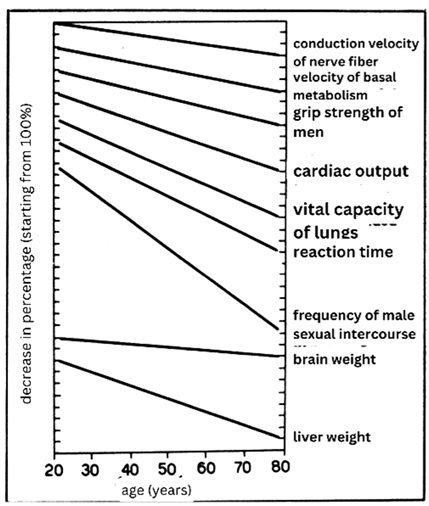Thoughts on Ageing
Citation: Vincze, J., & Tiszay, G. V.-. (2023). Thoughts on Ageing . Current Opinion, 3(4), 362–369. https://doi.org/10.52845/currentopinion.v3i4.237
Accepted: July 25, 2023; Published: 30 August 2023
Copyright: ©2023 Vincze, J et al. This is an open-access article distributed under the terms of the Creative Commons Attribution-NonCommercial License (BY-NC-4.0), https://creativecommons.org/licenses/by-nc/4.0/, which permits unrestricted noncommercial use, distribution, and reproduction in any medium, provided the original authors and source are credited.
Funding:Nil
Competing interests: None.
Authorship: All authors have contributed significantly to this publication.
Corresponding author: Janos Vincze , Health Human International Environment Foundation, Budapest, Hungary
DOI:
https://doi.org/10.52845/currentopinion.v3i4.237Keywords:
biophysics, human-time,, , gerontologyAbstract
Ageing is a process along the Time-Age axis that characterises the degree of wear and tear of the body. An eminent scholar of gerontology, F. Bourlier, has argued that “if in the future we wish to better understand the causes and effects of ageing at the molecular, cellular, organ, organism or population level, we must not use a single technique, but all those which, from biophysics to sociology, will enable us to approach the effects of Time on Life from several angles.” From a biological point of view, every living organism has a dual purpose: its own survival and the reproduction of the species. With age, the functionality of some analysers also decreases significantly. The process of ageing is thus included in the programme, without its beginning and end being clearly defined. It follows from this view, which is almost unanimously accepted by gerontological authors, that a person cannot die a natural death under present conditions, but that death is always caused by some disease process. Cross-linking prevents molecules from moving freely, and the molecules thus linked form inactive units, which disturb the physiological state of proteins and nucleic acids, resulting in a loss of function. From this we can draw an extremely important conclusion about the ageing process: all the movements that a person repeats constantly throughout their life can be easily reproduced in old age.
Citation: Vincze, J., & Tiszay, G. V.-. (2023). Thoughts on Ageing . Current Opinion, 3(4), 362–369. https://doi.org/10.52845/currentopinion.v3i4.237
Accepted: July 25, 2023; Published: 30 August 2023
Copyright: ©2023 Vincze, J et al. This is an open-access article distributed under the terms of the Creative Commons Attribution-NonCommercial License (BY-NC-4.0), https://creativecommons.org/licenses/by-nc/4.0/, which permits unrestricted noncommercial use, distribution, and reproduction in any medium, provided the original authors and source are credited.
Funding:Nil
Competing interests: None.
Authorship: All authors have contributed significantly to this publication.
Corresponding author: Janos Vincze , Health Human International Environment Foundation, Budapest, Hungary
Downloads

